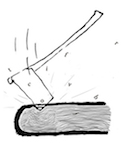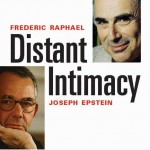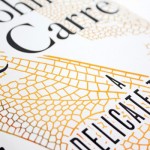Hatchet Job 2014 | Previous years | Manifesto | Press
Frederic Raphael on A Delicate Truth by John le Carré
THE TLS
JOHN LE Carré is the grand master of the low down. That he writes under a pseudonym seems emblematic of a writer who has made himself shady the better to be at home in the dark places of the world of double-dealing. His novels are those of a worldly, wise moralist whose opinions are implicit in devious plots in which good men are regularly done down or find themselves warped by force majeure.
A Delicate Truth begins “On the second floor of a characterless hotel” in Gibraltar, where “a lithe, agile man in his late fifties restlessly paced his bedroom. His very British features, though pleasant and plainly honourable, indicated a choleric nature brought to the limits of his endurance”. Hustled into identifying with a decent chap in an unpleasant spot (with a bed “big enough for six”), the reader has little time to wonder what “very British features” look like and how they can be deemed “honourable” on sight while being simultaneously engorged with rage. Despite his parading all these manifestly insular qualities, “it would not have occurred to many people, even in their most fanciful dreams, that he was a middle-ranking British civil servant, hauled from his desk in one of the more prosaic departments of Her Majesty’s Foreign and Commonwealth Office, to be dispatched on a top-secret mission of acute sensitivity”. That would indeed make for a fanciful dream.
“Paul”, as he is trying to get used to calling himself, is said to be in a state of “incarceration”, although he is free to go to the brasserie and is, we soon discover, merely waiting to be summoned to play his pseudonymous part in the pre-arranged, HMG-backed skulduggery which involves nabbing “Punter”, a terrorist supplies specialist, and having him ferried, by some high-powered mercenaries, to a ship anchored off Gibraltar, whence he will be taken to face the presumably excruciating fate merited by a mixed-race “unprincipled fucking merchant of death . . . the chosen intimate of the worst dregs of international society”. That way, “we” can keep our hands clean, but lend one of them at the same time to some of “our” dodgy cousins.
The mark has been lured into believing he is about to rendezvous with Aladdin (said, helpfully, to be named “as in the famous Arabian fairy tale”). According to Paul’s South African informant, Elliot, pronounced “Illiot”, Aladdin is “basically a mixed-race Pole I personally would not touch with a barge”. In case we fail to register this witticism the first time around, we get a second chance later.
“Paul” seems long in the tooth for a Whitehall warrior summoned to scale Gibraltar’s precipitous flanks at night, but – a little like the gallant, puffed character played by David Niven in The Guns of Navarone – up he goes, in the company of an assortment of salts of the earth, the diminutive Jeb (who says “like” and “see” a lot, to establish how Welsh he is) and “Shorty”, the six-foot-six toughie, both of whom will appear in later episodes. Punter’s trap has been baited with the prospect of buying “Manpad”, “just the item if you are contemplating bringing down an unarmed airliner. Such is the mentality of these murderous shits”, Illiot tells the plainly honourable, pliantly dutiful “Paul” during his flashbacked briefing.
After the deployment of state-of-the-dark-arts equipment, and some unscheduled gunfire from aliens on the beach, Operation Wildlife is said to have gone perfectly according to plan; only not a word to anyone, not even the missus. Paul duly turns back into Christopher Probyn and is rewarded with a Caribbean ambassadorship and accidental knighthood (the Queen happened to be passing). But, of course, things do not rest there. Le Carré appends a grateful list of sources who have instructed him on today’s military-politico-plutocratic amalgam. My own contacts in MI6 are meagre, but I am promised, with some vigour, by a veteran with “very British features” that no straight diplomat would have been deputed to officiate on such a mission – which must show how little your average old hand knows (or tells) about what really, really now goes on.
The Wildlife exercise turns out, as if we never guessed, not to have been quite the triumph Kit Probyn was promised. The spin of wheels within wheels begins to utter sinister noises before several of them fall off. Along the bumpy way we discover that governments are themselves governed these days by outside pressures, as sinister as they are – what else? – American. The funding mother of the murky goings-on is revealed to be a Texan millionairess called Miss Maisie. This guiding spirit of the multinational conglomerate that calls itself “Ethical Outcomes” makes her entrance thus: “halfway down Crispin’s left arm, clinging to it with one bejewelled claw, trips a tiny woman in a pink chiffon dress with matching hat and high-heeled shoes with diamanté buckles”. How precisely the “deep Southern” Miss Maisie manages to trip halfway down anyone’s villainous arm matters less than the derision with which she is paraded. Who but a bad person “trips” rather than walks, has a “claw” for a hand, and flashes diamanté buckles? And how about this for a kicker into touch? “Age? It depends which parts of the lady we are talking about.”
It is no surprise when our hero, Toby, a Foreign Office up-and-comer who can play the toff but is state-educated and sprung from pious “artisan” parents, is informed by his long-time mentor, a diplomat of impeccable public-spiritedness, whose private pleasures are of the kind attached to Englishmen by our Gallic neighbours, that this “friend of the Tea Party, scourge of Islam, homosexuals, abortion and, I believe, contraception [is] currently residing in Lowndes Square, London SW. One entire side of it!”. Le Carré affects, as so often, to be making daring revelations about How Things Really Work. In the clever process, he stretches his thrills with mixed clichés, idiosyncratic phrases (can people “go faint at the knees”?) and witless dialogue whaleboned with “he retorted stiffly” and the like.
It is part of the convention of reviewing thrillers that one does not reveal how it all ends. Without breaching this protocol, I can report that the sum of things is saved by an alliance between Old and Young England, Kit and Toby, who – after all manner of expected twists and counter-twists – finally blow the gaff to the right-minded press, helpfully listed as “the Guardian, the New York Times, Reprieve, Channel 4 News, BBC news, ITN, Sky”. Thank heaven, we are being prompted to breathe, that in today’s diamanté world good men can still find their appetites for a delicacy like the truth.
This article originally appeared in the TLS on 24/4/13
Read all reviews for A Delicate Truth
The Omnivore on Twitter | The Omnivore on Facebook | Sign up for The Omnivore Digest










